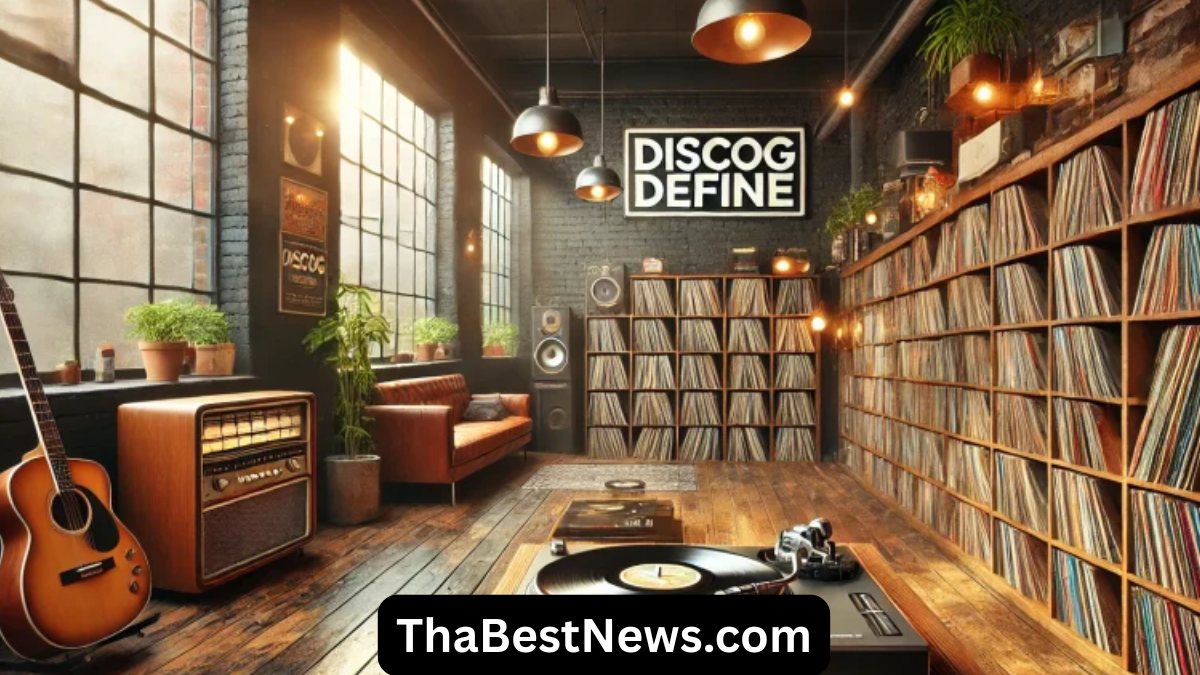Discog Definition When you hear the word “Discog,” what comes to mind? Is it a typo of “disc” or something more? If you’re into music, vinyl, or collecting, the term might ring a bell. Discogs is a powerhouse in the music world, but not everyone knows what it really is or how it works. So, let’s break down the discog definition and explore why it’s a vital resource for music lovers worldwide.
What Is Discog?
Discogs, short for “discographies,” is an online database and marketplace dedicated to music. It’s a community-built platform where users can catalog, buy, and sell music records ranging from vinyl to CDs, cassettes, and even digital releases.
Origins and Purpose of Discog
Founded in 2000 by Kevin Lewandowski, Discog Definition started as a way to create a comprehensive and user-editable database of electronic music releases. The vision? To build a free, detailed, and reliable discography that anyone could access and contribute to. Since then, it has grown exponentially to cover all music genres and formats.
How Discog Works
At its core, Discogs relies on user contributions. People from all over the world add release information, update metadata, and list their collections or items for sale. This crowdsourced model means the database is always evolving and expanding, but it also requires a community effort to keep information accurate.
The Role of Discogs in the Music Industry
Discogs plays several crucial roles, especially in today’s digital and vinyl resurgence era.
For Collectors and Music Enthusiasts
If you’re a collector, Discogs is like a candy store. You can track your collection, identify rare releases, and find the best deals. Its marketplace connects buyers and sellers, often with records that are hard to find elsewhere.
For Artists and Labels
Artists and record labels use Discogs to maintain accurate release histories and reach fans directly. It provides exposure and transparency in a market where physical formats still hold significant value.
Features of Discogs
Extensive Music Database
Discogs boasts millions of releases and artist profiles, making it one of the largest music databases online. Each entry includes detailed information such as track listings, release dates, labels, catalog numbers, and more.
Marketplace for Buying and Selling
One of the platform’s standout features is its marketplace, where users can buy and sell physical music formats. The system includes seller ratings, price histories, and shipping info to help users make informed decisions.
Community Contributions and Editing
The platform thrives because of its users. Anyone can contribute by submitting new releases or editing existing ones, subject to community review to maintain quality.
How to Use Discogs Effectively
Creating an Account and Building Your Collection
Signing up is free, and once you do, you can create a “Wantlist” or catalog your own music. This personal collection acts like a digital inventory, helping you keep track of your records.
Searching and Discovering Music
The search tool on Discogs is powerful. You can filter by artist, genre, format, and even specific labels. It’s a fantastic way to discover new music or track down elusive records.
Buying and Selling Records on Discogs
For those interested in buying or selling, the marketplace is easy to use. You can browse listings, message sellers, and complete transactions securely. Just remember to check seller ratings and return policies.
Discogs vs Other Music Databases
Discogs Compared to AllMusic
While AllMusic focuses on editorial reviews, biographies, and curated content, Discogs is more data-driven and community-edited, specializing in detailed release information and marketplace features.
Discogs Compared to MusicBrainz
MusicBrainz is another open music database but leans more towards digital metadata. Discogs has a stronger presence in physical music formats, especially vinyl.
The Importance of Discogs for Vinyl Culture
Preserving Vinyl History
Vinyl is back in vogue, and Discogs is at the forefront of documenting this resurgence. The database preserves the details of countless vinyl releases, helping keep music history alive.
Valuing and Authenticating Records
Collectors often rely on Discogs to assess a record’s value and authenticity. The platform’s pricing history and condition guides offer insights crucial to buying or selling.
Potential Downsides of Discogs
Accuracy and User-Generated Content
Since Discogs is community-driven, some entries can contain errors or incomplete info. However, active moderation and the collective effort of users usually keep things in check.
Marketplace Fees and Policies
Discogs charges sellers a small fee, and shipping policies vary widely, so buyers and sellers should be cautious and read terms carefully.
The Future of Discogs
Innovations and Growth
Discogs continues to innovate with better data tools, mobile apps, and integrations with streaming platforms, making it easier than ever to connect physical and digital music worlds.
Expanding Beyond Music
There are talks and early efforts to include other collectible media types, potentially broadening Discogs’ reach beyond just music.
Conclusion
Discogs is much more than just a database. It’s a vibrant community, a marketplace, and a cultural hub for music lovers. Whether you’re a casual listener, a serious collector, or an artist, understanding the discog definition opens doors to a world where music history is preserved, discovered, and shared with passion. So next time you want to know more about a record, chances are Discogs has the answer waiting for you.
FAQs
Q1: Is Discogs free to use?
Yes, creating an account and browsing the database is completely free. Fees only apply when selling items on the marketplace.
Q2: Can I trust the accuracy of Discogs listings?
While generally reliable due to community moderation, occasional errors happen. Cross-checking information is a good practice.
Q3: What types of music formats does Discogs cover?
Discogs includes vinyl, CDs, cassettes, Discog Definition, and even rarer formats like 8-tracks and reel-to-reel tapes.
Q4: How can I sell my records on Discogs?
After creating an account, you can list items in the marketplace, set prices, and communicate with buyers directly.
Q5: Does Discogs offer a mobile app?
Yes, Discogs offers mobile apps for easier cataloging, browsing, and buying on the go.



